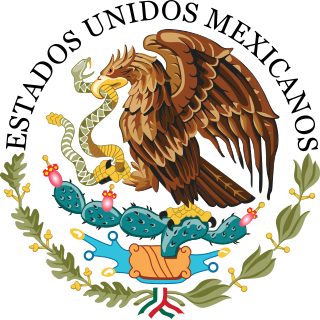
The politics of Mexico function within a framework of a federal presidential representative democratic republic whose government is based on a multi-party congressional system, where the President of Mexico is both head of state and head of government. The federal government represents the United Mexican States and is divided into three branches: executive, legislative and judicial, as established by the Political Constitution of the United Mexican States, published in 1917. The constituent states of the federation must also have a republican form of government based on a congressional system as established by their respective constitutions.

The Institutional Revolutionary Party is a political party in Mexico that was founded in 1929 and held uninterrupted power in the country for 71 years, from 1929 to 2000, first as the National Revolutionary Party, then as the Party of the Mexican Revolution and finally as the PRI beginning in 1946.

The National Action Party is a conservative political party in Mexico founded in 1939. The party is one of the main political parties in Mexico, and since the 1980s has had success winning local, state, and national elections.

The Party of the Democratic Revolution is a social democratic political party in Mexico. The PRD originated from the Democratic Current, a political faction formed in 1986 from the Institutional Revolutionary Party (PRI). The PRD was formed after the contested general election in 1988, which the PRD's immediate predecessor, the National Democratic Front, believed was rigged by the PRI. This sparked a movement away from the PRI's authoritarian rule.

The Chamber of Deputies is the lower house of the Congress of the Union, the bicameral parliament of Mexico. The other chamber is the Senate. The structure and responsibilities of both chambers of Congress are defined in Articles 50 to 70 of the constitution.

The Ecological Green Party of Mexico is a green political party in Mexico.

General elections were held in Mexico on Sunday, 2 July 2000. Voters went to the polls to elect a new president to serve a single six-year term, replacing President Ernesto Zedillo Ponce de León, who was ineligible for re-election under the 1917 Constitution. The election system ran under plurality voting; 500 members of the Chamber of Deputies for three-year terms and 128 members of the Senate for six-year terms.

The Mexican state of Chihuahua held an election on Sunday, 4 July 2004. At stake was the office of the Chihuahua State Governor, all 33 members of the unicameral Chihuahua State Congress, and 67 mayors and municipal councils.

Roberto Madrazo Pintado is a Mexican politician, member of the Institutional Revolutionary Party. He was the candidate of the alliance between his party and the Ecologist Green Party of Mexico (PVEM) in the 2006 Mexican presidential election.

An election for governor was held in the Mexican state of Colima on 6 July 2003, simultaneously with federal congressional midterm elections. Gustavo Vázquez Montes of the Institutional Revolutionary Party (PRI) was initially declared the winner, with 83,995 votes; second place went to the National Action Party (PAN) with 69,180, with the Party of the Democratic Revolution (PRD) in third place with 32,042. Following accusations of irregularities, the gubernatorial result was declared void by the state electoral authorities and an extraordinary election was held on December 7, 2003. Meanwhile, Carlos Flores Dueñas of the PRI served as interim governor.

The Mexican state of Nuevo León held an election on Sunday, 6 July 2003. At stake was the office of the Nuevo León State Governor, and all 42 members of the unicameral Nuevo León State Congress, and 51 mayors and municipal councils.

An extraordinary gubernatorial election was held in the Mexican state of Colima on 10 April 2005. The election was necessitated by the death of incumbent governor Gustavo Vázquez Montes of the Institutional Revolutionary Party (PRI) in a plane crash on 24 February 2005.

The New Alliance Party is a state-level political party in Mexico founded in 2005.
The LXII Legislature of the Congress of Mexico met from September 1, 2012, to August 31, 2015. All members of both the lower and upper houses of the Congress were elected in the elections of July 2012.
José Antonio Aguilar Bodegas is a Mexican politician and member of the Institutional Revolutionary Party. He was candidate of the Allianza por Chiapas for governor of Chiapas.

Legislative elections were held in Mexico on 6 July 2003. Although the National Action Party received the most votes, the Institutional Revolutionary Party won 224 of the 500 seats. Voter turnout was only 41%.
The Alianza Fidelidad por Veracruz was an electoral coalition in the Mexican state of Veracruz.

Gubernatorial elections were held in fourteen Mexican states on Sunday, July 4, 2010. The gubernatorial elections were held simultaneously with other state and local elections. Elections for governor were held in Aguascalientes, Chiapas, Chihuahua, Durango, Hidalgo, Oaxaca, Puebla, Quintana Roo, Sinaloa, Tamaulipas, Tlaxcala, Veracruz and Zacatecas.

Everyone for Mexico, was a political coalition encompassing the Institutional Revolutionary Party (PRI), New Alliance (PANAL), and the Ecologist Green Party of Mexico (PVEM) to compete in the 2018 Mexican general election led by the presumptive nominee José Antonio Meade Kuribreña. The campaign was previously known as Meade Ciudadano por México until INE deemed unconstitutional the usage of the name of a political candidate within the name of a coalition, stating that allowing it would make Meade receive extra benefit from every piece of propaganda of the coalition.

Legislative elections were held in Mexico on 6 June 2021. Voters elected 500 deputies to sit in the Chamber of Deputies for the 65th Congress. These elections took place concurrently with the country's state elections.













